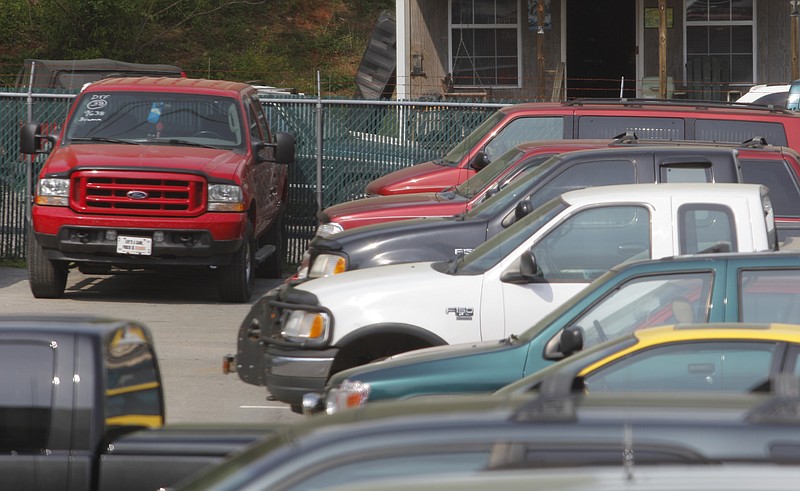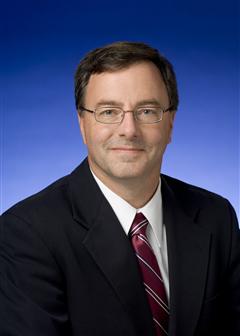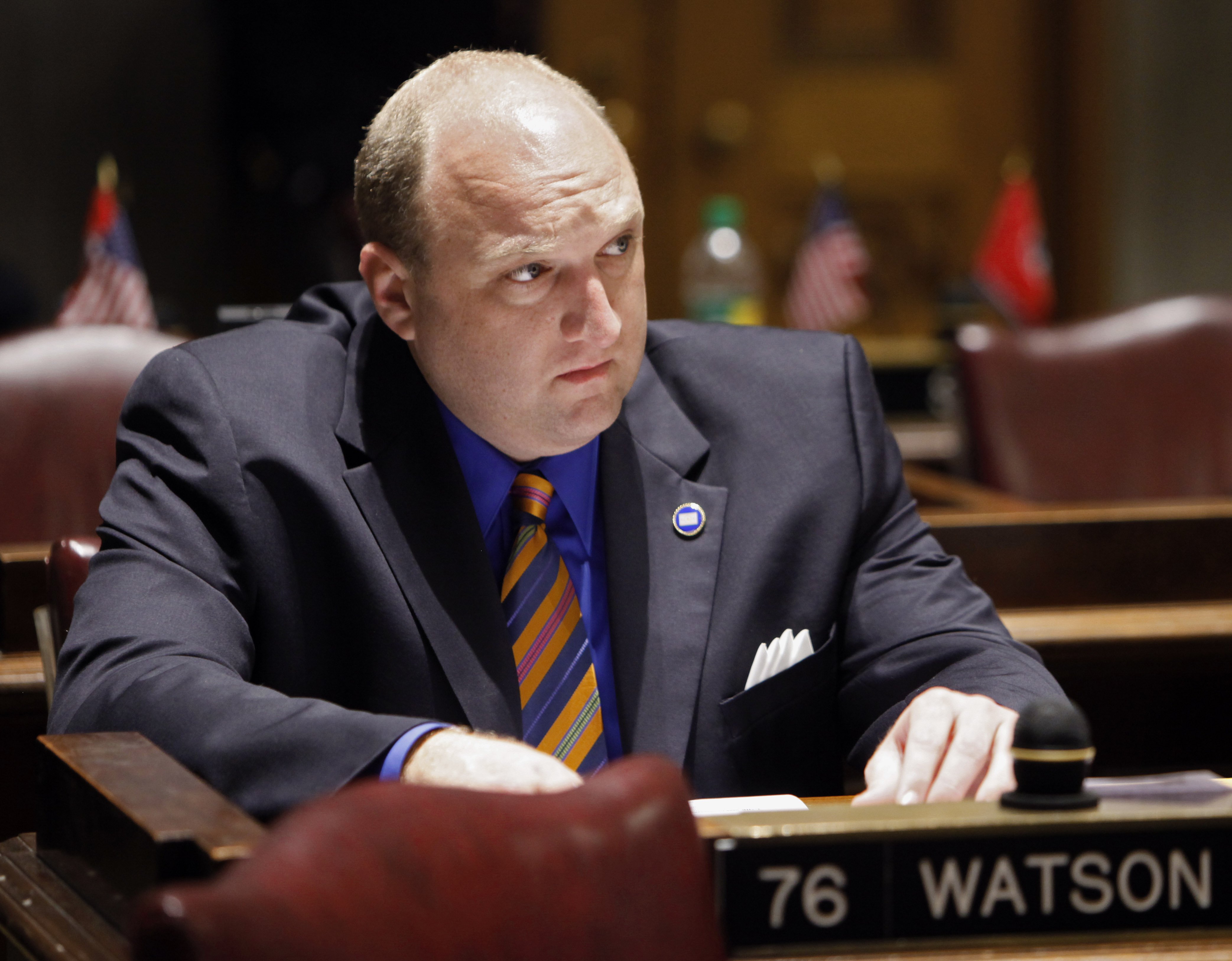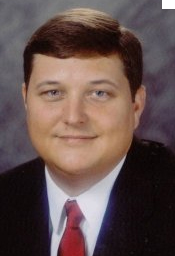
None
For today, see Lawmakers eye stricter oversight of drug task forcesOther articles in this series:Sunday:Records show history of impropriety in 10th Judicial DistrictA litany of casesTruth, rights suffer in 10th District, defense attorneysMondaySome are held to account, but many go free, case files showMost officers in trouble weren't charged despite evidenceTuesdayFired officers seek justiceGrand jurors claim improper influence in McMinn caseWednesday$100,000 for travel tops DTF spendingSome DA practices run afoul of state rulesThursdayPharmacist says traffic stop was drug task force retaliationQuestions swirled around drug chiefFridayLawmakers eye stricter oversight of drug task forces
Why did the drug task force agent sit on the side of the road?
Because that's where the money is.
A river of drugs and money moves along interstate highways in Tennessee and the nation. Drug task force agents know just how to fish in it, and they get to keep whatever they catch.
Agents with the 10th Judicial District in Bradley, McMinn, Monroe and Polk counties caught about $5 million between 2006 and 2010 in a practice known as interdiction - using surveillance and information to try to stop traffickers carrying drugs or the money to buy drugs.
Some say hitting drug traffickers in the wallet is the toughest blow against the drug trade.
"Properly managed and properly overseen, interdiction is crucial to stop the flow of money back to the source countries, Mexico and the like, because if that money doesn't make it back, it slows down the drugs coming back to the United States," said Sammie McNelley, a Bradley County Sheriff's Office detective who is assigned to the Chattanooga office of the Drug Enforcement Administration.
"When they [drug agents] get some of those semi trucks with five, six, 10 million dollars, that hurts. That 50 kilos on the other side, that doesn't hurt as much. They've got plenty more sitting in a warehouse," he said.
But the idea of law enforcement agencies having to subsist on what they can seize makes some - attorneys, lawmakers and civil libertarians - uneasy.
"That kind of behavior gives the appearance of policing for profit, and that's not what we as a state should be doing," said state Rep. Vance Dennis, R-Savannah, who worked with state Sen. Mike Bell, R-Riceville, this year on a bill to put a rein on activities of the drug task forces.
Bell serves in the 10th Judicial District, where state auditors have questioned extravagant spending by the self-financed drug task force under former director Mike Hall.
Dennis' territory is in the 24th Judicial District in West Tennessee, whose director and others have been indicted on theft charges and where the district attorney and sheriff, a local college official and others have been implicated in allegations of misusing seized cars, TVs, jewelry and even a state-owned helicopter.
Bell and Dennis tried unsuccessfully to pass legislation this year wresting cash seizures away from the drug task forces and turning the proceeds over to the state for distribution.
In Dennis' district, former drug task force director Steven Lee has been named in two indictments charging him with theft over $10,000, official misconduct and lying to a state auditor. (See 24th District audit online.) The task force's former administrative assistant, Leona Longworth, has been charged with theft and lying to a state auditor.
While Lee was in charge, auditors said, seized property such as luxury cars, golf carts, heavy equipment, stereos, televisions, handguns and assault rifles disappeared from evidence and was handed out to people in the community.
Auditors said Lee's son took home a seized gold and diamond bracelet, a laptop and a car radio and used a drug task force car to drive between McKenzie and Jackson, Tenn.
They said District Attorney Hansel McAdams drove seized vehicles, including a Harley-Davidson motorcycle and a Cadillac, used task force planes and helicopters to travel in the district and took home guns and other equipment belonging to the task force.
Henry County Sheriff Monte Belew told auditors that McAdams allowed him to drive a confiscated BMW Z-3 for personal use and ceremonial events, and an unnamed businessman who was the shooting coach at the local college told auditors that McAdams and Lee gave him a drug task force car to use.
Auditors reported that Longworth and her ex-husband stole drug evidence from the task force office for personal use and sale. They took home seized property including drugs, a handgun, a flat-screen TV, four-wheelers and a utility trailer, auditors said.
Show me the money
The $5 million or so hauled in by the 10th District task force came mostly from traffic stops on Interstate 75. Money from highway seizures is what kept the rest of the task force in business, paying salaries, buying equipment and generating money to support undercover buys. (See details of the 10th District task force's activities online.)
In 2009, the 10th District task force was honored by the National Criminal Enforcement Association for making the largest money seizure in the nation the previous year.
That $5 million sum doesn't count more than 200 vehicles, from motorcycles to mobile homes, or other gear such as laptops, cameras and weapons, that 10th District task force agents seized between 2006 and 2010 as tools or proceeds of drug trafficking.
In some cases, owners lost cash, cars and property even though they weren't charged with any crime.
The Institute for Justice, an Arlington, Va.-based libertarian public interest law firm, gives Tennessee a "D" for forfeiture laws that it says fail to protect property owners' rights and allows local law enforcement agencies to keep the proceeds from seizures.
The cash from the 10th District seizures went into the drug task force's bank account and the property, including guns, was sold or swapped. Many of the vehicles were auctioned off; some were returned after their owners paid hundreds or thousands of dollars to the task force, which kept all the proceeds to finance its operations.
It all works because of a process called "civil forfeiture," which means law officers can seize money or property by asserting it was used to traffic drugs or was bought with proceeds from trafficking. They don't even have to charge the owners with a crime to take their cash, cars or other possessions.
The only way for owners to try to get their property back is to post a $350 bond and attend an administrative hearing whose time and place is set by the state.
Across the state, drug task forces have been accused of - even filmed - using the law to take money from motorists or truck drivers.
In Nashville, a WTVF-TV Channel 5 series called "Policing for Profit" documented drug task force officers stopping drivers, allegedly seizing their cash and letting them go. Channel 5 alleged that drug task forces from elsewhere districts were allowed to work on sections of Interstate 40 if they agreed to return a cut of what they seized to the host agency.
(See Channel 5 series at www.newschannel5.com/category/211433/nc5-investigates-policing-for-profit.)
Kim Helper, district attorney general for the 21st District, said the district's drug task force agents went to the 15th District to train its officers in interdiction on I-40 and that a share of the money they seized would be returned to the 21st District to cover its costs under a written agreement.
Dennis said changes are needed.
"If you have individuals who are breaking the law and trafficking in illegal drugs, they need to be charged," he said. "If they can't make a criminal charge stick against someone who is trafficking in drugs, they shouldn't be taking assets from those people."
Dennis also disagreed with McNelley about whether it's more important to seize drugs or money.
"I don't think law enforcement denies they are putting much more effort into going after cash going out of the state rather than drugs coming into the state. I have a problem with that," he said.
"If we don't put at least an equal effort into stopping drugs coming into our state and getting into the hands of our children, we're not doing our job."
Money Motives
Money was certainly on the minds of the 10th drug task force leadership from 2006 to 2010.
The task force's bylaws even state that "one of the goals is to make the task force self-supporting, even profitable," while fighting drugs and related criminal activity. In June 2008, the task force's second in command, Lt. Don Williams, wrote a memo reveling in upgrades at the task force and reminding the troops what paid for them.
"Director Mike Hall has taken us out of the dark ages and provided the DTF Office with additional personnel, the BEAST evidence [management] system, vehicles, new offices, purchased the DTF building, paved the parking lot, got us salary increases, clothing allowances, Christmas bonuses, time off when we needed it, new sidearm pistols, new long rifles, level IV tactical entry team heavy duty vests, tactical green uniforms and all of the other equipment items to ensure that we have the best equipment need (sic) to do our jobs in a professional manner," Williams wrote.
He called the highway interdiction team "the 'backbone' of the Drug Task Force," adding, "They are the money makers who primarily seized the money to pay for our salaries."
Former task force agent Brian Sargent said, "We all knew that if we didn't bring anything in, we would eventually run out of money."
"I know the interstate guys must have felt tremendous pressure to keep up with the million-dollar seizures they were getting before I came to work there," said Sargent, who worked for the task force from February 2008 to October 2009. He is no longer in law enforcement.
Several defense attorneys who practice in the 10th District and spoke to the Times Free Press said allowing police to seize and keep assets invites corruption.
"You create perverse incentive to abuse your public when you make law enforcement a for-profit enterprise," said attorney Ben McGowan of Chattanooga.
Another Chattanooga attorney, John Cavett, had a case in U.S. District Court in which the 12th District task force in Grundy, Marion, Rhea and Sequatchie counties had a paid "bounty hunter" who got close to drug traffickers and helped set up busts, all for 20 percent of the take.
"When you hire a snitch on a contingent fee? That's preposterous," Cavett said.
According to his deposition in U.S. District Court, informant James McMillon helped make at least eight cases in the 12th District.
Perhaps his crowning achievement was posing as an agent for Mexican drug cartel members in Tennessee who needed to launder money. He met with a man in Destin, Fla., who flew in a private jet to Rhea County with $287,000 worth of gold and jewels that he believed he was going to sell to the drug gang. Instead, he was busted on the runway and the jewels and plane seized.
"The government had this guy running around making cases for them out of the thin air and getting a financial incentive to do so," Cavett said. "It's one thing to find someone in a criminal enterprise and 'turn them' or even send an undercover into an ongoing operation but no one was even investigating the [man] in Florida, who may well have not thought of the scheme until Mr. McMillon came along."
Civil rights
Civil libertarians and others have accused some law officers of racial profiling during highway interdictions.
A local man who served for a year on a Bradley County grand jury said he saw evidence of profiling in cases brought by the local drug task force. Since grand jury action is secret, the juror asked that his name not be used.
"They set up on the interstate; they sit there and they watch. They pull over nonwhites from out of state," the grand juror said. "They'll make up reasons for pulling them over: 'The individual looked nervous and tried to hide behind the post of the door, so I followed him.' 'The individual followed too closely and veered across white line, so I pulled him over.'
"I believe at 70 miles an hour you can tell a man looks black and has Florida tags on his car, but you can't tell that he's nervous," the grand juror said.
"I'd ask [the agents] if they had a copy of the video showing them going too fast. They'd always say no," he said. (See copies of agents' affidavits for traffic stops online.)
When he asked to be shown the law or asked questions, "They get angry. They get short with you. They don't like to be questioned like that. From my experience on the grand jury, they'll say anything they have to to get a conviction."
The juror also said the grand jury foreman sometimes didn't actually count the jurors' votes.
"He never took a 'no' vote, but just declared a true bill," the juror said. "Most of the grand jurors were older. Their view was that these people wouldn't have charges brought against them if they weren't guilty, so they'd vote 'yes.'"
Records of traffic stops, arrests and seizures that the Times Free Press examined weren't definitive. A person's race is listed when he or she is arrested and on some criminal court documents, but not in the forfeiture cases from the state Department of Safety.
While trying to trace 80 cases from 2007 to 2010 through the courts, the newspaper found five listed as white, nine Hispanics, 1 Asian, 24 blacks and 41 whose race couldn't be determined from records reviewed.
Contact staff writer Judy Walton at jwalton@timesfreepress.com or 423-757-6416. Subscribe to Judy on Facebook at Facebook.com/JudyCTFP.




